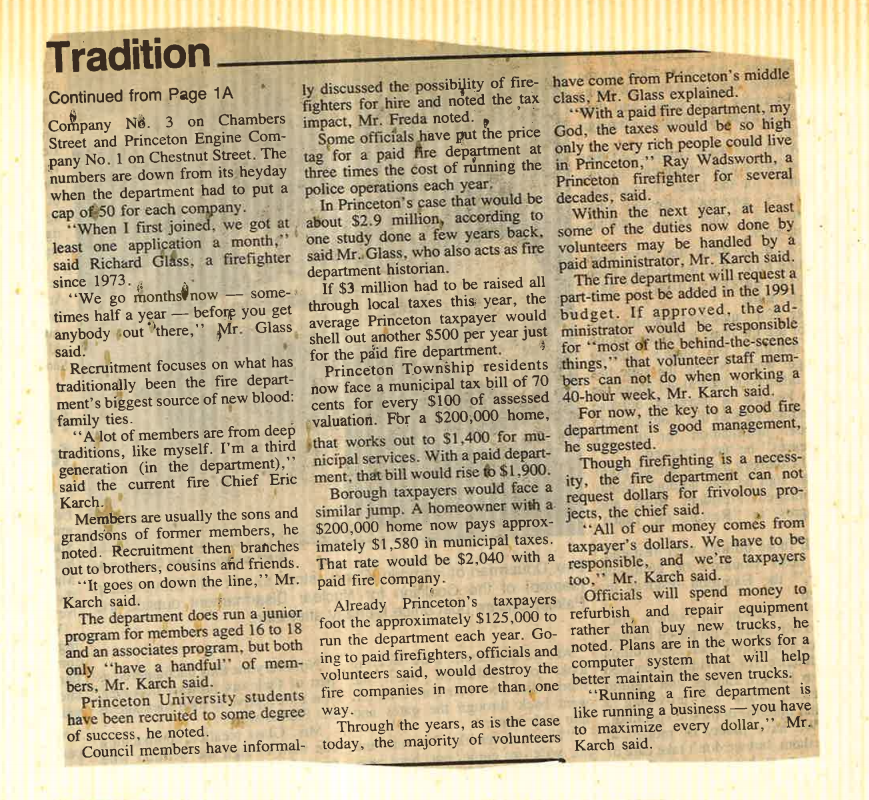

17 April, 1990
Volunteer tradition endures among Princeton firefighters
By John P. McAlpin
Staff Writer
In seven months William Rodweller will turn 70. And yet, he swears, he will still respond to all but a few of the Princeton Fire Department’s 500-plus service calls.
Even if the Chestnut Street resident wanted to hold off, he couldn’t. Not only does he live across from the firehouse for Princeton Engine Company No. I, he is bound by family tradition to serve, he said.
“I just like it. You get a good feeling helping out. It’s what I do,” Mr. Rodweller said between good-natured boasts of how he could hold own against the younger men.
Mr. Rodweller epitomizes the typical volunteer firefighter in Princeton — working class with family ties stretching back generations. Princeton’s firefighters are also proud of their volunteer tradition that reaches back over two centuries.
Today, officials say the three fire companies face a serious shortage of volunteers, forcing many to discuss and worry about the possibility of a paid company in the near future.
That possibility, the Princeton firefighters say. would ruin a spirit of volunteerism that has lasted since 1788.
“There’s just something special about a volunteer fire company, something special,’.” said Borough Councilman Mark Freda. himself a volunteer with the Hook and Ladder Company.
“It’s people going out to help their neighbors,” he said. “It would be a shame to lose that tradition and that’s some-thing that goes back 202 years now,” Mr. Freda added.
Membership now runs approximately 125 for the Hook and Ladder Company, Mercer Engine Company No. 3 on Chambers Street and Princeton Engine Company No. 1 on Chestnut Street. The numbers are down from its heyday when the department had to put a cap of 50 for each company.
When I first joined, we got at least one application a month,” said Richard thins, a firefighter since 1973.
We go months now — sometimes half a year — before you get anybody out there,” Mr. Glass said.
Recruitment focuses on what has traditionally been the fire department’s biggest source of new blood: family ties.
“A lot of members are from deep traditions, like myself. I’m a third generation (in the department),” said the current fire Chief Eric Karch.
Members are usually the sons and grandsons of former members, he noted. Recruitment then branches out to brothers, cousins and friends.
“It goes on down the line,” Mr. Karch said.
The department does run a junior program for members aged 16 to 18 and an associates program, but both only “have a handful” of members, Mr. Karch said.
Princeton University students have been recruited to some degree of success, he noted.
Council members have informally discussed the possibility of firefighters for hire and noted the tax impact, Mr. Freda noted.
Some officials have put the price tag for a paid fire department at three times the cost of running the police operations each year.
In Princeton’s case that would be about $2.9 million, according to one study done a few years back, said Mr.Glass, who also acts as fire department historian.
If $3 million had to be raised all through local taxes this year, the average Princeton taxpayer would shell out another $500 per year just for the paid fire department.
Princeton Township residents now face a municipal tax bill of 70 cents for every $100 of assessed valuation. For a $200,000 home, that works out to $1,900.
Borough taxpayers would face a similar jump. A homeowner with a $200,000 home now pays approximately $1,580 in municipal taxes. That rate would be $2,040 with a paid fire company.
Already Princeton’s taxpayer foot the approximately $125,000 to run the department each year. Going to paid firefighters, officials and volunteers said, would destroy the fire companies in more than one way.
Through the years, as is the case today, the majority of volunteers have come from Princeton’s middle class, Mr. Glass explained.
“With a paid fire department, my God, the taxes would be so high only the very rich people could live in Princeton firefighter for several decades, said.
Within the next year, at least some of the duties now done by volunteers may be handled by a paid administrator, Mr. Karch said.
The fire department will request a part-time post be added in the 1991 budget. If approved, the administrator would be responsible for “most of the behind-the-scenes things,” that volunteer staff members can not do when working a 40-hour week, Mr. Karch said.
For now, the key to a good fire department is good management, he suggested.
Though firefighting department can not request dollars for frivolous projects, the chief said.
“All of our money comes from taxpayers dollars. We have to be responsible, and we’re taxpayers too,” Mr. Karch said.
Officials will spend money to refurbish and repair equipment rather than buy new trucks, he noted. Plans are in the works for a computer system that will help better maintain the sense trucks.
“Running a fire department is like running a business — you have to maximize every dollar,” Mr. Karch said.

Staff photo • Mark Czajkowski
Princeton Fire Chief Eric Karch of Engine Company No.3 is flanked by Joe Meyers (left), assistant chief, of Hook and Ladder, and Patrick Root, deputy chief, of Engine Company No.1